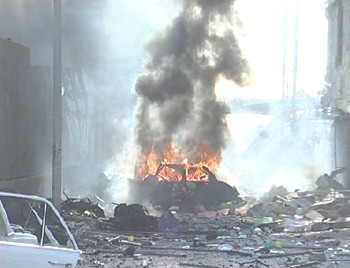Nesrine Khodr
12 Apr - 17 May 2008
NESRINE KHODR
Terrorism has become part of daily life for many in our globalised world- or so it seems. It has somehow become part of our collective consciousness.
In Lebanon, there has been a series of political assassinations during the past three years.
Twelve all in all of which three of the targeted survived and numerous passers-by were killed. The explosions have happened in a periphery often not bigger than the centre of Amsterdam.
Images of the crime scenes were always diffused live on television, and everyone could witness what was going on.
Very often the bodies and limbs of the victims were put under the lenses of the cameras and broadcast as such.
Disgust, abhorrence, anger and of course fear - stuff that terrorism creates- is what people are left with from experiencing these acts and watching them through the eyes of the lenses, yet the enemy remains invisible.
Raw images of horror in which there is no space for fact finding or a suggestion of a way out which creates a fatigue amongst those who experience it.
By obsessively recycling images of terror people create their own despair. By making a concentration of events and reducing the gaps between the events I create a situation where complex feelings can result into indifference by seeing too many of these images, and at the same time make you aware of this horrifying process of being forced to be indifferent. It’s a struggle to fight the seemingly inevitable indifference.
It’s a confrontation with these images that apparently holds the power to decrease in intensity by multiplication over time. And this recognition generates feelings of “the horrible”; an installation as a kind of intellectual-emotional fall out of events and a creation of images which instantly gain iconic dimensions.
No one yet knows by whom and why exactly all of this was carried out. The UN has recently declared that the explosions have been executed by a criminal gang (probably with political ties), and numerous speculations are circulating.
Investigations have been carried out, a UN resolution was passed to make way for an international court of justice to be appointed, and The Hague has been chosen as the seat of this court, and the summer of 2008 might be the time for its implementation.
Terrorism has become part of daily life for many in our globalised world- or so it seems. It has somehow become part of our collective consciousness.
In Lebanon, there has been a series of political assassinations during the past three years.
Twelve all in all of which three of the targeted survived and numerous passers-by were killed. The explosions have happened in a periphery often not bigger than the centre of Amsterdam.
Images of the crime scenes were always diffused live on television, and everyone could witness what was going on.
Very often the bodies and limbs of the victims were put under the lenses of the cameras and broadcast as such.
Disgust, abhorrence, anger and of course fear - stuff that terrorism creates- is what people are left with from experiencing these acts and watching them through the eyes of the lenses, yet the enemy remains invisible.
Raw images of horror in which there is no space for fact finding or a suggestion of a way out which creates a fatigue amongst those who experience it.
By obsessively recycling images of terror people create their own despair. By making a concentration of events and reducing the gaps between the events I create a situation where complex feelings can result into indifference by seeing too many of these images, and at the same time make you aware of this horrifying process of being forced to be indifferent. It’s a struggle to fight the seemingly inevitable indifference.
It’s a confrontation with these images that apparently holds the power to decrease in intensity by multiplication over time. And this recognition generates feelings of “the horrible”; an installation as a kind of intellectual-emotional fall out of events and a creation of images which instantly gain iconic dimensions.
No one yet knows by whom and why exactly all of this was carried out. The UN has recently declared that the explosions have been executed by a criminal gang (probably with political ties), and numerous speculations are circulating.
Investigations have been carried out, a UN resolution was passed to make way for an international court of justice to be appointed, and The Hague has been chosen as the seat of this court, and the summer of 2008 might be the time for its implementation.

